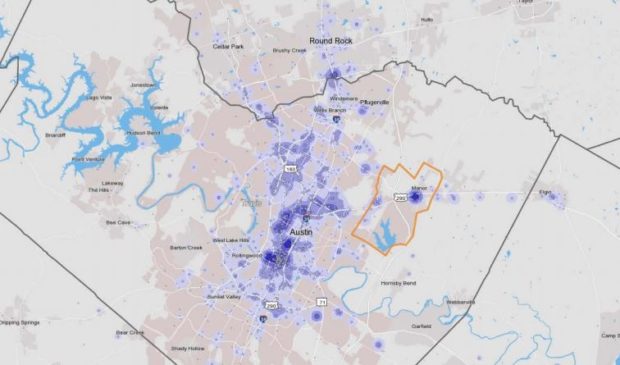Council members raise concerns about WildHorse PID
Wednesday, August 31, 2016 by
Jack Craver Travis County’s first attempt at its very own public improvement district could be imperiled by a skeptical City Council, which by state law must give its blessing to such projects if they are located within Austin city limits.
Discussing the WildHorse Ranch PID during a work session Tuesday, Council members echoed concerns voiced earlier this month by some members of the Travis County Commissioners Court about the lack of guarantee that the proposed 4,300-unit project would include affordable housing.
Earlier this month, the Commissioners Court approved the creation of the PID, which includes 2,164 acres in Eastern Travis County, south of the intersection of U.S. Highway 290 East and State Highway 130. Council must approve a resolution of “no objection” within 30 days for the PID to go forward. City staff has recommended that Council do that at its upcoming meeting on Thursday, ahead of the Sept. 8 deadline.
Most of the affected land was annexed by the city in 2013, and the city will begin the process of taking over the remaining property in December. The entire property will be in the city’s “full-purpose jurisdiction.”
While the county is pledging to spend $65 million of bond funds, it has asked the city to kick in $5 million to $7 million over the next decade to cover one-third of the cost of a new road needed for the development. The developer and the county will also each pick up a third of the cost. When the plan was originally developed, city financing was not involved.
It wasn’t clear to Mayor Pro Tem Kathie Tovo what the city would get in return for its largess. There is no language in the measure Council is being asked to approve that would commit the developer to providing affordable housing or other “community benefits,” she noted.
Staff pointed out that the money the city would be contributing to the road would free up the developer to fund the construction of a 5-acre multimodal transportation site as part of the development as well as two school sites for the Manor Independent School District, of which the new homes will be a part.
Council is welcome, however, to add language to the “no objection” resolution making the city funds for the road contingent on the development’s inclusion of affordable housing, said City Attorney Anne Morgan.
However, both Council Member Ora Houston and Pete Dwyer, the project developer, pointed out that some housing experts had suggested that affordable housing in the PID is not ideal, since the surrounding Manor area already has a large concentration of low-income housing. Dwyer, who promised “more than 35 units” of affordable housing when presenting the plan to the Commissioners Court earlier this month, said that county housing officials had suggested building the first stage of the development with market-rate homes and then reconsidering the issue of adding affordable units a few years down the road.
The selling prices of the homes to be built will range from $200,000 to $800,000, said City Chief Financial Officer Elaine Hart.
Houston, whose district borders the proposed development, had already voiced frustration with the Commissioners Court for not including her in conversations about the development earlier this summer. On Tuesday, she appeared to remain skeptical of the project, saying that the city is “trying to serve two masters” – the county and the developer. She dismissed any financial aid given to the development in exchange for community benefits as “bribery.”
“Some people call it bribery, some call it incentives,” responded Mayor Steve Adler, noting that state government does not offer local governments many tools to encourage affordable housing.
Council Member Don Zimmerman expressed his delight at the likely absence of below-market-rate housing in the development and issued his customary denunciation of subsidized housing.
“The only kind of affordable there is,” he said, “is market affordable.”
It was hard to get a read on whether Council is poised to approve a resolution, and if so, with what type of language. An aide to Tovo said she was “weighing the matter.”
The Austin Monitor’s work is made possible by donations from the community. Though our reporting covers donors from time to time, we are careful to keep business and editorial efforts separate while maintaining transparency. A complete list of donors is available here, and our code of ethics is explained here.
You're a community leader
And we’re honored you look to us for serious, in-depth news. You know a strong community needs local and dedicated watchdog reporting. We’re here for you and that won’t change. Now will you take the powerful next step and support our nonprofit news organization?






